The observations in this article are based on the author’s conversations with Ukrainians, both inside and outside of government, and others in Kyiv during an October 31-November 2, 2019 visit.
How do Ukrainians assess the performance and prospects of President Volodymyr Zelenskiy, now five months in office, as he tackles the country’s two largest challenges: resolving the war with Russia and implementing economic and anti-corruption reforms? In two words: cautious optimism. Many retain the optimism they felt when Zelenskiy swept into office this spring, elected with more than 70% of the vote. At the same time, they express caution about how his presidency will perform.
Optimism
Almost everyone credits Zelenskiy with being open-minded and genuinely sincere in his desire to promote reform, make progress in ending the conflict with Russia in Donbas, and build a successful Ukrainian state. They see his young supporting team — the cabinet ministers’ average age is 39 — as energetic and pro-reform. They want to move quickly.
Zelenskiy has brought many new faces into his presidential office. Likewise, new faces populate the cabinet of ministers and his political party, Sluha Narodu (Servant of the People, which was also the name of his television show before he became president). These people went through their formative years in the mid 1990s and 2000s. Like Zelenskiy himself, they came of age after the collapse of the Soviet system.
Zelenskiy, moreover, has a position unique for Ukrainian presidents since the country regained independence in 1991. He has his own man as prime minister, and Sluha Narodu controls a solid majority of seats in the Rada (parliament). He thus is well positioned to press through reforms and other changes — and has every incentive to do so since, if things go badly, he will have no one to blame other than himself.
All of this generates optimism that, finally, Ukraine can make a definitive breakthrough and proceed quickly down the path to becoming a normal European state — what many joined the Maidan Revolution protests to achieve. However, cautions also arise.
Capacity to make domestic changes?
Some question whether Zelenskiy’s team has the professional skills and intellectual capacity to manage the government and deliver real change. They have set some lofty ambitions. For example, Prime Minister Oleksiy Honcharuk has suggested the economy will grow by 40% in five years. Accomplishing that will prove a challenge. It will require a focused reform program and discipline among Sluha Narodu members in the Rada.
Whether Sluha Narodu can maintain the needed discipline is, for many, an open question. The party holds 252 of 423 seats in the Rada; another 27 seats that would represent Crimea, illegally annexed by Russia in 2014, or parts of Donbas occupied by Russian and Russian proxy forces, remain unfilled. As it takes 226 votes to pass legislation, Sluha Narodu has real political power. But questions have arisen about differences within the party, with some already seeing factions aligning with particular oligarchs. Lack of party unity could bode ill for Zelenskiy’s legislative agenda.
Another question concerns the nature of Zelenskiy’s relationship with oligarch Ihor Kolomoisky, who owns the television channel that broadcast Zelenskiy’s popular comedy show. A September Zelenskiy-Kolomoisky meeting in the presidential office undercut prior Zelenskiy assurances that Kolomoisky would have no influence over him.
The primary test case for that relationship remains Privatbank, in which Kolomoisky was a major shareholder. The National Bank of Ukraine nationalized Privatbank in 2016, after an audit revealed losses on the order of $5.5 billion. Kolomoisky has filed suit to reclaim his ownership share or wants $2 billion in compensation. He won a favorable ruling in a Ukrainian court earlier this year, though he lost a ruling in a parallel case in London.
Questions about Privatbank’s future have slowed consideration by the International Monetary Fund (IMF) of a new program of credits for Ukraine. If Kolomoisky were to prevail, that would almost certainly kill the IMF program. However, the ministers of finance and economy oppose any compromise with Kolomoisky, and Zelenskiy supporters point to statements by the president and his office that Zelenskiy will not let Kolomoisky win. They express frustration that those statements have not satisfied IMF officials.
Another concern is that Zelenskiy follows opinion polls too closely and adjusts his positions if they appear unpopular. For example, Zelenskiy came out shortly after his election in favor of allowing the sale of agricultural land (a moratorium on such sales dating back to the 1990s has proven a major impediment to development of Ukraine’s agricultural sector). Apparently based on poll results, he subsequently decided to limit sales to Ukrainian citizens. While it might not be surprising that he follows polls, his approval rating in early October exceeded 70% — wildly high by Ukrainian standards. He has political space to take controversial decisions that might go against pollsters’ findings.
Peace, Donbas, and Russia
The simmering conflict in eastern Ukraine, where Russian and Russian proxy forces occupy part of Donbas, has now entered its sixth year. Zelenskiy attaches top priority to ending that conflict and restoring Ukrainian sovereignty. He and his team justify this in real and understandable terms: More Ukrainian soldiers die each week along the line of contact. Moreover, they feel that now could offer their best opportunity to reach a settlement with Moscow.
Zelenskiy seeks a summit meeting of the “Normandy format,” which would involve Russian President Vladimir Putin, German Chancellor Angela Merkel, and French President Emmanuel Macron. To try to shake things loose on Donbas, Zelenskiy endorsed the Minsk agreements reached in 2014 and 2015, accepted the “Steinmeier formula” for implementation of Minsk (albeit reinterpreting its terms), and ordered Ukrainian military forces to disengage and pull back from the line of contact in two locations, with a third disengagement possible in the near future.
The president’s team hopes these steps will set up a summit meeting in which progress can be made or, failing that, the blame falls on Putin. Other Ukrainians worry, however, that Zelenskiy appears too eager for agreement. That could lead Putin to up his demands. They also question whether he has solid red lines on where to stop in any negotiation with the more experienced Russian leader.
Concern about relationships with West
As Kyiv prepares for a possible Normandy format summit, Ukrainians are nervous about the backing they will receive from Germany and France. They note the decision to re-admit Russia to the Parliamentary Assembly of the Council of Europe, the nearing completion of the Nord Stream II gas pipeline, and the apparent French desire to move toward business as usual with Moscow and restore the G-8 by bringing Russia back in. All these actions strike Ukrainians as steps to return to a more normal Europe-Russia relationship, despite the fact that the Russians have done nothing to correct their aggressions of the past five-plus years.
Ukrainians also express nervousness about whether the congressional impeachment inquiry might lead to a reduction in U.S. support for Ukraine. Ukrainian officials note that Secretary of State Mike Pompeo’s decision last week to cancel a visit to Kyiv just two days after it was proposed did not help in this regard. Kyiv wants full U.S. backing as it prepares for the possible Normandy summit, especially as Ukrainians see the United States as the only Western country that can serve as a counterbalance to Russia.
So, cautious optimism
The bottom line is that Ukrainians are both optimistic and cautious about what Zelenskiy might achieve. Depending on whom one speaks to, the emphasis on optimism or caution varies, though caution seems to win out more than optimism, at least in the short term.
Zelenskiy faces two early tests: how he handles a Ukrainian-Russian-German-French summit meeting (assuming that it happens), and whether he can reassure the International Monetary Fund and others (both in Ukraine and in the West) that he will protect Privatbank and that there will be no compromise with Kolomoisky. These questions will affect judgments about Zelenskiy’s ability over the longer term to press forward with the kinds of economic reforms and anti-corruption measures that would enable a significant acceleration in Ukraine’s growth rate and in its movement toward European normalcy.
The Brookings Institution is committed to quality, independence, and impact.
We are supported by a diverse array of funders. In line with our values and policies, each Brookings publication represents the sole views of its author(s).

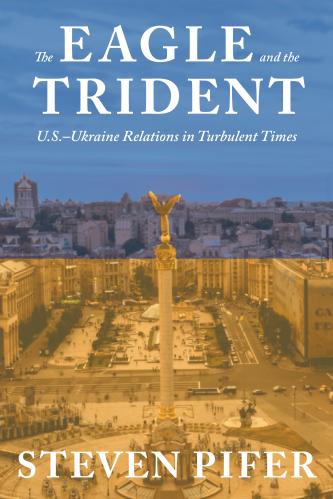
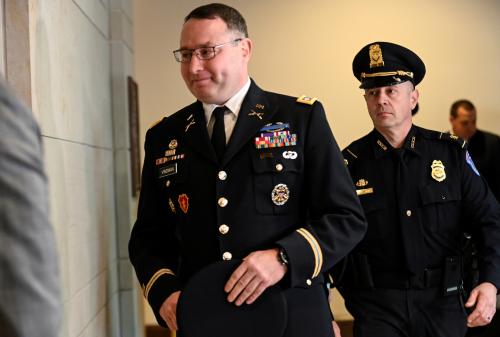
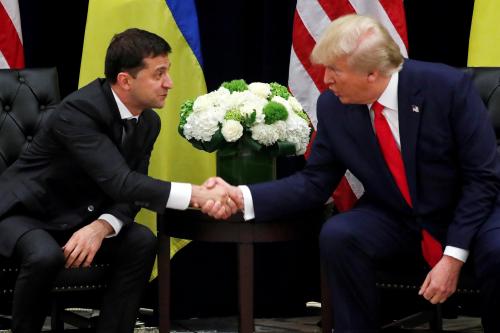
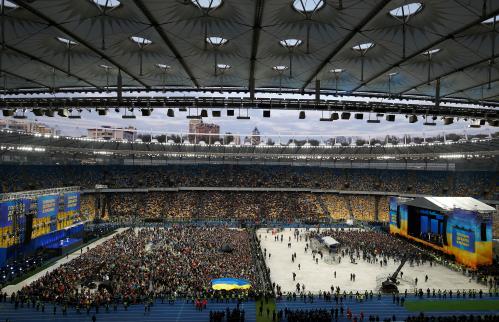

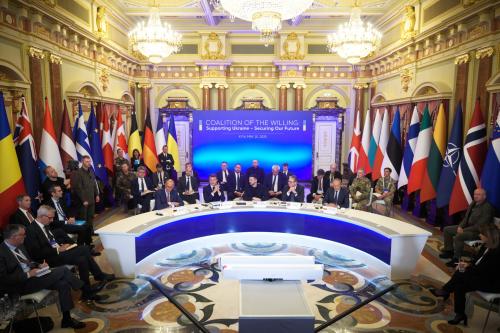
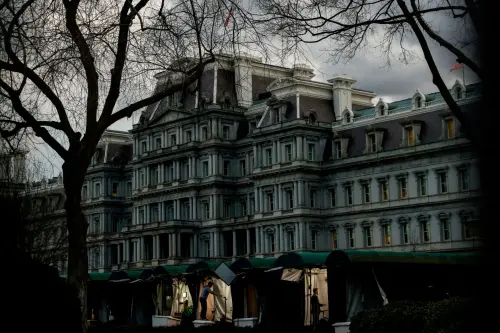
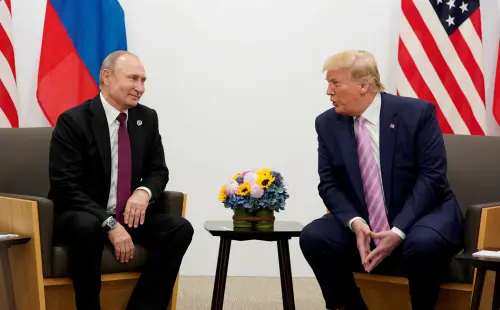
Commentary
Five months into Ukrainian President Zelenskiy’s term, there are reasons for optimism and caution
November 4, 2019